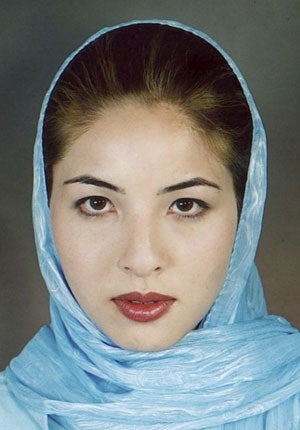Ahmadinejad promises fair appeal for reporter
Iranian president intervenes to head off diplomatic rift with US

Your support helps us to tell the story
From reproductive rights to climate change to Big Tech, The Independent is on the ground when the story is developing. Whether it's investigating the financials of Elon Musk's pro-Trump PAC or producing our latest documentary, 'The A Word', which shines a light on the American women fighting for reproductive rights, we know how important it is to parse out the facts from the messaging.
At such a critical moment in US history, we need reporters on the ground. Your donation allows us to keep sending journalists to speak to both sides of the story.
The Independent is trusted by Americans across the entire political spectrum. And unlike many other quality news outlets, we choose not to lock Americans out of our reporting and analysis with paywalls. We believe quality journalism should be available to everyone, paid for by those who can afford it.
Your support makes all the difference.One day after a closed-door court in Tehran sentenced an American-Iranian reporter to eight years in prison for alleged espionage, aides to Iran's President, Mahmoud Ahmadinejad, said he told prosecutors to make sure she is fairly defended in her appeal.
The latest signals from the Iranian leadership may help avert or delay a damaging new diplomatic row between Tehran and Washington at a time when overtures from President Barack Obama seem to offer some hope of thawing relations that have been on ice for three decades.
The White House said on Saturday that Mr Obama was "deeply disappointed" by the court's decision on Roxana Saberi, 31, a freelance journalist who has reported for news organisations including the BBC and National Public Radio in the US. Raised in North Dakota, Ms Saberi, once a finalist in the Miss America contest, holds a Masters degree from Cambridge University. She moved to Iran six years ago and holds dual nationality. She was arrested in January on charges she was working without proper press credentials. Earlier this month, however, those charges were raised to spying for the US.
The American administration called the allegations "baseless" while her father, Reza Saberi, said his daughter was tricked into making self-incriminating statements. "The trial of course was not a real trial," he said yesterday. "She didn't know there was a trial until a few minutes before it began."
Exactly how the case of Ms Saberi relates to domestic politics – Mr Ahmadinejad is seeking re-election in June – and to Iran's manoeuvrings on the world stage is hard to divine. Some analysts suggest her trial was orchestrated by hardliners to sabotage bridge-building with Mr Obama.
At the same time, her plight may hand Mr Ahmadinejad a bargaining chip, just as the White House seeks to reopen channels with his government, both inviting Iran to participate in regional discussions on the future of Afghanistan and offering new talks on the future of its nuclear programmes.
Hope of some relief for Ms Saberi, now being held in Tehran's notorious Evin Prison, came with the news of the letter, reportedly written by Mr Ahmadinejad's chief of staff, Abdolreza Sheikholeslami, and sent to the chief prosecutor, Saeed Mortazavi, who is known for his harsh record. It made reference to her and to a Canadian-Iranian blogger, Hossein Derakhshan, who is also detained. "At the President's insistence, please ensure all the legal steps taken in these cases are based on justice," the letter said, urging the prosecutor "personally ensure those accused enjoy all freedoms and legal rights to defend themselves."
Reza Saberi is in Iran, but complained he was not allowed into his daughter's trial. Meanwhile, the Swiss government, which represents US diplomatic interests in Iran, was attempting to verify her exact whereabouts and check her welfare.
Playing out in the background, meanwhile, was another diplomatic dispute concerning a UN conference on racism, which is to open in Geneva this morning with an address by Mr Ahmadinejad. Several western states – though not Britain – have refused to attend because of expectations Iran will insist the conference explicitly accuses Israel of racism. The United States, with its first African-American in the White House, said on Saturday that "with regret" it would join a boycott. Others boycotting are: Israel, Italy, Canada, Australia, and The Netherlands.
Join our commenting forum
Join thought-provoking conversations, follow other Independent readers and see their replies
Comments